New Interim Parliament in Nepal
|
The current parliament is expected to hold elections in June for a body that will create a new constitution ending the monarchy and establishing a democratic republic.
|
Nepal: Maoists Take Seats In Parliament
Stratfor, January 16, 2007
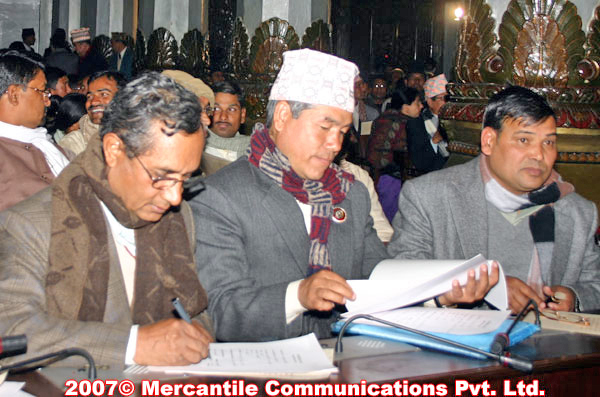 Nepal's Maoist rebels took seats in the 330-member National Congress the evening of Jan. 15, marking the first time Maoists were represented in parliament. The Nepali Congress party holds 85 seats in parliament while the Communist Party of Nepal (Unified Marxist Leninist) and the CPN (Maoist) group each have 83 seats The Maoists entered the interim legislature only hours after the previous parliament agreed on a temporary constitution allowing the former guerrillas to hold political office. The current parliament is expected to hold elections in June for a body that will create a new constitution ending the monarchy and establishing a democratic republic. Nepal's Maoist rebels took seats in the 330-member National Congress the evening of Jan. 15, marking the first time Maoists were represented in parliament. The Nepali Congress party holds 85 seats in parliament while the Communist Party of Nepal (Unified Marxist Leninist) and the CPN (Maoist) group each have 83 seats The Maoists entered the interim legislature only hours after the previous parliament agreed on a temporary constitution allowing the former guerrillas to hold political office. The current parliament is expected to hold elections in June for a body that will create a new constitution ending the monarchy and establishing a democratic republic.
---------------------------------------------------------------------------------------------------
Historic Interim Statute Formed in Nepal
by
Amit Pyakurel, Ohmynews.com, January 16, 2006
The parliament reinstated in Nepal as the result of the historic mass movement in the April 2006 has unanimously approved the promulgation of the new interim constitution on the evening of Jan. 15. The statutes include the former rebel aoist group CPN in the country's authority, following the party's departure from parliament and the launch of their rebellion in 1996.
The new legislature is believed by the major political stakeholders in the country to have finally paved a way towards the constituent assembly election schedule to be held this June. Alongside the promulgation of the new interim constitution, the preceding constitution is now dissolved.
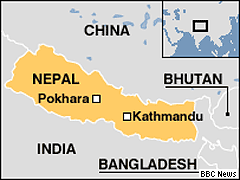
Speaker Suvash Nembang, in his speech, said that, "The first session of the reinstated HoR took place on April 28, 2006, Friday, and continued till today, Jan. 15, 2007, Monday, during which the House was in session for 263 days. Of this, the House remained in session 110 times in 96 days making a total of 305 hrs and 30 minutes spent in actual House of Representatives' activities."
The new House contains 330 MPs, a record number in the history of Nepali politics, as the previous parliaments, including the recently dissolved one, hadn't contained more than 205 members in Parliament. The new Parliament contains 83 representatives from the CPN (Maoists), headed by the Maoists' spokesperson Krishna Bahadur Mahara, where the party has nominated 10 other members who are perceived to have no considerable connection with any political party. These nominated members are claimed to be "free" of any kind of party politics or interests.
The significant feature of the newly promulgated constitution is that it had been carved totally by the political parties, whereas the king's approval to form any constitutional or legal structures was compulsorily needed in the past. The interim legislature has completely discarded any role of the monarchy in the legislative procedures, as per the fear of many that if the monarchy is left active, or any "feudal elements" are allowed to have their influence, then it would bring fragility on the road towards the constituent assembly election.
The House that was reestablished following the success of the April movement, when a number of people died and got injured during a 19-day peaceful demonstration against King Gyanendra, was meant to act as an interim legislative head and its sole objective was to create an appropriate environment for the constituent assembly election, as many have perceived that only the constituent assembly election could establish complete sovereignty, rule of law, and privilege, to a myriad number of Nepalese, from every indigenous and less-privileged groups, who are considered to have been deprived of adequate rights and opportunities so far, a core cause for any rebellion to occur as viewed by analysts.
The major efforts carried out by the preceding parliament included the abolishment of the absolute powers enjoyed by the king and the royal family and to initiate serious talks with the Maoist rebels who had been struggling for a "radical transformation" through an armed rebellion, since the Maoists refused to recognize the preceding constitution and the parliament 1996 and started an armed insurgency then. The historic proclamation of the parliament on May 18, which plucked the powers of the monarch and declared the House as a supreme body of the country, has been viewed as a major breakthrough in Nepali politics, due to which the recent promulgation of the interim statute, that also includes members from the Maoists, has been possible.
Although the interim constitution was overwhelmingly welcomed, unanimously by the participating members of the parliament in the voting, some MPs and some legal experts have criticized the constitution by claiming that it restricts the independence of judiciary, lacks adequate checks and balances, and makes the prime minister all powerful, among others. While the prime minister seems to have acknowledged the criticisms and said that he understands the suggestions by the members of Parliament to amend the interim constitution, he also requested the MPs to withdraw their amendment proposals by saying that a correction would be made simultaneously with the initiation of the process of the constituent assembly election as it is of the "utmost priority."
At any event, the promulgation of the interim constituent has certainly helped to relieve many of the past uncertainties and fears. It has given an official shape to the vows of political parties as per the people's mandate expressed by the April uprising, which had demanded the country to turn into a democratic republic by making the people all powerful. After the Maoists are assimilated into mainstream politics, as per the interim constitution, Nepal would see a significant progress on the way towards the proposed constituent assembly election.
---------------------------------------------------------------------------------------------------
Old Wounds Threaten New Nepal
by Aljazeera, January 16, 2006
As Nepal's Maoists settle into their seats as members of the country's new 330-member interim parliament, Al Jazeera's Rajesh Sundaram and Shaun Devitt visit the country to carry out a series of exclusive interviews.
Amid the atmosphere of hope, they found the country's still fragile peace could be under threat from violent separatist splinter groups and that many questions from 10 years of civil conflict remain unanswered.
Asmita says she is not fond of carrying weapons and killing people but will "do it as history requires, bringing about a change in the society".
Although only 20-years-old she is already familiar with doing both through her role as a cadre with the second division of the Ram Briksh brigade of the Communist party of Nepal, better known as Maoists.
Asmita estimates she has killed between 20 and 25 people, but at her camp near the town of Janakpur several hundred kilometres from the capital, Kathmandu, in the country's southeastern Terai plains she tells Al Jazeera that she and her comrades are now "ready to lay down arms" for the Nepali people.
That moment may now be close as the Maoists come in from the cold both politically and physically and take up their positions in Nepal's new 330-member interim parliament.
Terai threat
The rebels struck a deal in November with the multi-party government that saw a cessation of hostilities in the Himalayan kingdom thus ending a conflict that has so far claimed 13,000 lives.
The peace accord saw the former rebels led by Pushpa Kamal Dahal, commonly known as Prachanda, agree to lay down their weapons in return for a promise by Girija Prasad Koirala, the Nepali prime minister, to name them in an interim government.
Now 84 former rebels have taken their seats alongside those they once fought in an administration meant to oversee elections for an assembly that will prepare a new constitution and decide the future of the monarchy, which the Maoists want abolished.
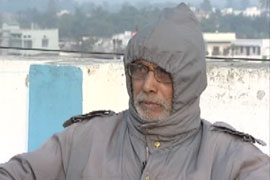 |
Goit openly admits his group
murdered Krishna Srestha
|
But, as unarmed UN officials are deployed across the country to monitor the handover of weapons from both sides, not everyone is excited by the prospect of a "new" Nepal.
At a secret location in an Indian town just over the border from southeast Nepal, Jai Krishna Goit emerges from the shadows to give his first ever television interview.
Goit is a former Maoist and leader of Janatantrik Terai Mutik Morcha (JTMM), which translates as the People's Terai Liberation Front, a deadly splinter group that he established in 2004.
One of JTMM's main political aims is an independent state for the Madhesis, the people of the Terai, the vast southern plains that stretch across Nepal.
Clad head to toe so he cannot be identified, Goit has accused the Maoists of betraying the Madhesis people.
Political killing
His followers and members of another splinter of the JTMM have recently undertaken an increasing number of attacks in regions of the Terai, and Goit says he will fight all those who threaten his people.
"The people of Terai will drive them out," he says. "Every child in Terai will fight against the army and the PLA and is willing to become a martyr."
On September 23 Krishna Srestha, a Nepalese parliamentarian, was shot dead by Goit's men in the Siraha district of Terai.
A mainstream political assassination is something the Maoists have yet to commit in 12 years of armed resistance, but Goit openly admits to the murder.
"We do not wish to take military action against someone, but we are compelled," he says and cites recent violence in the Terai town of Nepalgunj as a reason why the Madhesis feel left behind by the "new Nepal" need to protect themselves.
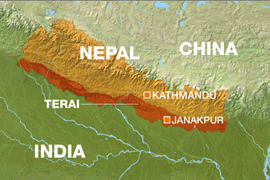 |
Goit and the JTMM want an
independent state in the Terai plains |
In an attack that was ethnically rather than politically motivated, gangs from the hills to the north of the town ransacked and torched shops while police looked on.
"Nepalgunj is proof to my point," says Goit, "that unless the Terai is independent, Madhesis will be deprived of their economic, political, cultural, linguistic or any rights. When the Madhesis houses were burnt down they could not find justice ... how will they secure our rights? Elections will not bring solutions."
Kiran Dwyer of the UN says the situation in Terai:"Is a tinder box that could spiral out of control," but after an exhausting journey back to Kathmandu Al Jazeera found the Maoist leader unperturbed by the threat of the JTMM and other disaffected groups.
Maoist abuse
Prachanda, now more a mainstream politician than a guerrilla fighter, dismisses offhandedly the attempts to derail the new interim government.
"The splinter groups in Nepal are very small, they are only located in a few districts they have very small numbers, if we go with them in a clash we can cross them in one week," he says.
The Maoist leader says his movement will eventually fully disarm and integrate into a new Nepal army for the new Nepal but the legacy of the old Nepal and the old Maoists remains.
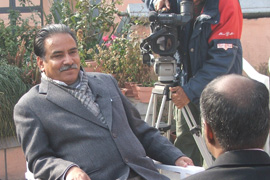 |
Prachanda is not concerned by the JTMM
and other splinter groups [Shaun Devitt] |
Indira Adhikari tells Al Jazeera her husband, Mukti Nath, was a good, loyal man and a well respected teacher in a remote village and for these reasons he was not liked by the Maoists.
Three years ago he was tied to a tree, beaten, stabbed and shot by Maoist guerrillas who accused him of spying and then put his body on public display as a warning to others.
Indira no longer fears reprisal from the Maoists but refuses to return to her village because of the public stigma attached to the perception that her husband was a police informant.
She now lives in hiding in Kathmandu and finds it hard to accept that her husband's killers are represented nearby in parliament as she and hundreds of other victims' families have yet to receive a thorough investigation.
The Maoists for their part say such atrocities are part of war and should be forgotten. They have said they are committed to bringing justice to families, but have yet to give details of how they will do so.
Krishna Bahadur Mahara, a communist party spokesman, says: "If a mother has lost her husband or sons in the revolution, it is possible that she can forgive the killers. She could consider the fact it happened during the revolution, that they sacrificed their lives."
Search for justice
While victims of Maoist violence are well documented by the officials, voices of those killed by the army and police have for long been silenced, hidden in the back alleys of Kathmandu.
Sharmila Tripathi's has been spearheading a fruitless campaign to allow families to discover the truth about their missing or deceased relatives.
Her husband Gyanendra, a student leader, was picked up by the army three years ago and she has not heard of him since.
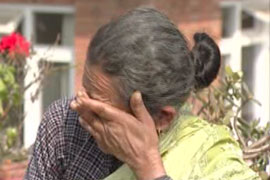 |
Indira Adhikari is still waiting for an
investigation into her husband's murder |
In a tiny room plastered with the images of other people who disappeared after the Nepal army's crack down on Maoist sympathisers she tells Al Jazeera: "We haven't found a single person we have been looking for till date."
For years now the army has refused to give families access to detention centers or even acknowledge their petitions.
Activists estimate the number of missing is in the thousands and the UN, is investigating human rights violations committed by both sides during the conflict years, is receiving very little assistance.
"We have been frustrated with the lack of cooperation we are getting from both parties, under the agreement we have from the government we should have access to all documents and we don't," says Kiran Dwyer.
So, while Nepal embraces a new political era the grievances of the Madhesis and the relatives of those who lost their lives highlight that the wounds of 10 years of civil conflict will take some time yet to heal.
|
 Home
Home Archives
Archives Nepal's Maoist rebels took seats in the 330-member National Congress the evening of Jan. 15, marking the first time Maoists were represented in parliament. The Nepali Congress party holds 85 seats in parliament while the Communist Party of Nepal (Unified Marxist Leninist) and the CPN (Maoist) group each have 83 seats The Maoists entered the interim legislature only hours after the previous parliament agreed on a temporary constitution allowing the former guerrillas to hold political office. The current parliament is expected to hold elections in June for a body that will create a new constitution ending the monarchy and establishing a democratic republic.
Nepal's Maoist rebels took seats in the 330-member National Congress the evening of Jan. 15, marking the first time Maoists were represented in parliament. The Nepali Congress party holds 85 seats in parliament while the Communist Party of Nepal (Unified Marxist Leninist) and the CPN (Maoist) group each have 83 seats The Maoists entered the interim legislature only hours after the previous parliament agreed on a temporary constitution allowing the former guerrillas to hold political office. The current parliament is expected to hold elections in June for a body that will create a new constitution ending the monarchy and establishing a democratic republic.



